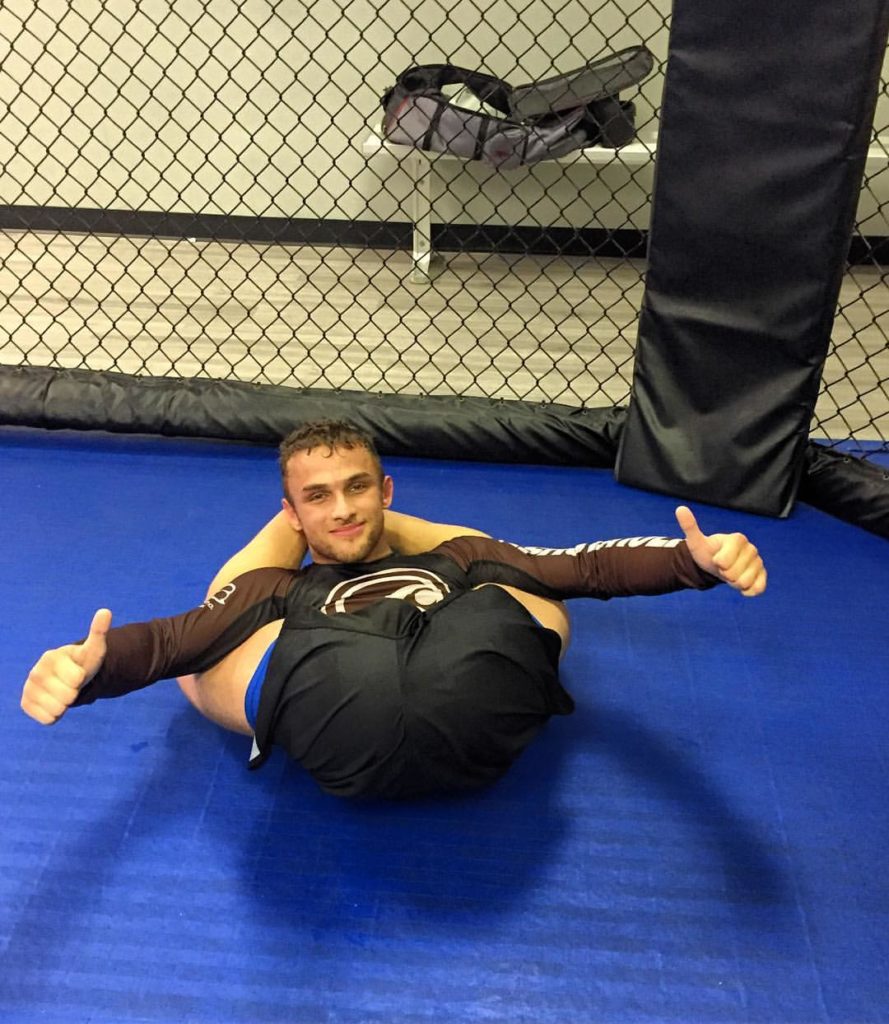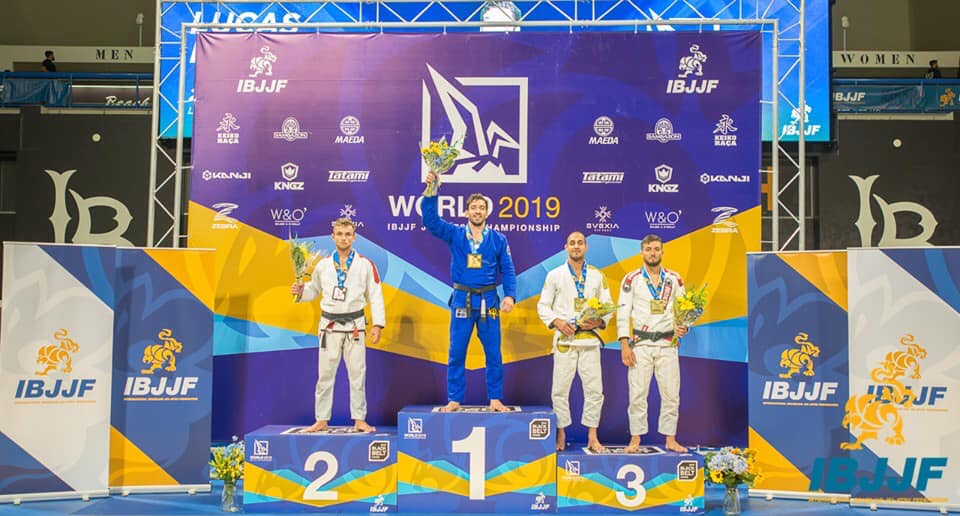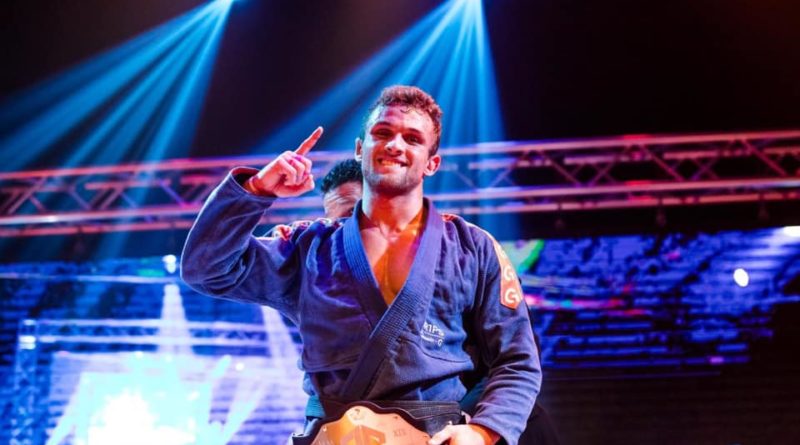Gracie Barra’s Golden Boy: An Interview With Lucas Valente
Forged from the same champion factory that has produced the likes of Romulo Barral, Felipe Pena, Samuel Braga, Gabriel Arges, et al, the “Golden Boy” Lucas Valente at 24 is already counted among the elite at such a young age. After bagging silver at the 2019 IBJJF Worlds (only yielding gold in a hotly debated match with the bemedaled veteran Lucas Lepri), he has gone on to win in ten different tournaments and is ranked the world’s top ranked black belt with the highest number of submissions in the past year.
In this interview, we go over his evolution in the sport, training with adult black belt competitors at such a young age, his mindset, goals, and long-term plans.
Grappling Insider: How and why did you start training?
Lucas Valente: “I started training because two of my uncles who are Drac’s students for over 25 years now, so when I was born they were already Drac’s students. They were actually close to black belt at the time so when I was born I was already involved with Gracie Barra Belo Horizonte, that is my hometown gym, right? That is the first gym of Professor Draculino and since a very young age I already had contact with all the people from the gym and Drac himself. That’s how I started.”
On his teachers
GI: You’ve got a very unique game. How did you develop your game?
Valente: “I believe my game was a mix of all the amazing professors that I had alongside my journey, you know, all of them of course under Professor Drac and my uncle, of course, and my first kids’ professor when I joined the kids’ program at Gracie Barra BH was Professor Mauro, and then Drac himself, of course Professor Marcelo (Uirapuru), Professor Sergio (Benini), Professor Claudio (Caloquinha), and pretty much every black belt from my hometown Belo Horizonte, they helped develop my game. I believe they helped develop the blend.”
GI: You started early, when did you realize you were truly passionate about Jiu-Jitsu?
Valente: “To be honest, I don’t remember a day in my life that I wasn’t passionate about Jiu-Jitsu. That was my childhood dream, you know, to be a professional Jiu-Jitsu fighter. I actually wanted to be a Jiu-Jitsu fighter and a superhero but then realized that I couldn’t really be a superhero so just a Jiu-Jitsu fighter.”
On competing at the highest levels
GI: You have been competing at the highest levels for some time now. How does competing at black belt compare to competing at lower belts?
Valente: “I always try to think long term, you know, and I believe that everything you do on the lower belts, they build you up to who you’re going to be when you become a black belt. So I believe that the black belt is the sum of everything you did until then.”
GI: At the level you compete, everyone you face is high level, especially your superfights. How do you prepare yourself mentally for them?
Valente: “I trust in my preparation, you know. I train insanely hard, I prepare myself insanely hard in every aspect of the game, mentally, physically, technically, so I just know I’m ready for anything.”
On having goals
GI: In my journey, I can’t even count how many times I almost quit, especially at blue belt like almost everybody else. Has it ever crossed your mind?
Valente: “Honestly, no. The reason why is because I don’t think I have ever seen any other, I’m not saying that I’m special or whatever, you know, but I believe that I never gave myself another option since I was a kid, and that’s it. Since I was a kid that’s all I did, it never crossed my mind, having another option.”
GI: I can’t believe that you’ve been there (at Gracie Barra Texas) for almost seven years now. I clearly remember when you were new, before you arrived, everyone at the school, we were already talking about you, that “there’s this guy who’s 18 years old, he’s insane…”, we were already talking about you before you got there [Lucas: “I was 17 the first time I came”]. When you started training with us you were a purple belt but we could all tell you were going far, you were already tapping out good black belts. Your flexibility and guard retention skills are out of this world but aside from that, what set you apart from other competitors or kids your age?
Valente: “Dedication, hard work, and the people around me. Having, every day, people like Drac and my uncle, give me advice, in every aspect of the life, for sure is a huge difference, a huge edge for me.”
On submitting the more experienced
GI: Did any adult training partner or competitor get upset after rolling with you, after you tapped them out?
Valente: “Yes. I believe people get frustrated, especially at first, especially when they don’t know anything about you, because they just see a kid and the kid beats them in training… you know I mean, of course I’m just saying here, I’m not really considering beating anybody in training… or you get the better out of someone in training, let’s put it that way, and they don’t know you, ‘so, a kid just got the best out of me,’ but then when they start seeing how insane, how hard you work, how well and how often you compete, they start (thinking), ‘okay, that makes sense,’ you know and that’s what… I mean, people from the gym including you and everybody good took really good care of me. Even if they did get frustrated at first, I believe that everybody was able to develop some type of caring relationship for me.”
On getting the black belt from Draculino
GI: I was there when you got your black belt three years ago and we all knew it was coming… Did you know it was coming? Was it a surprise? How did you feel when you got it?
Valente: “It’s hard to say, because Drac always says, ‘if you think you don’t deserve it, it’s probably because you don’t.’ At the same time I had this feeling like, maybe I deserve it but at the same time I feel like I have an infinite amount to improve, I mean just like everybody else. And Drac is always tricky because Drac doesn’t care how good you are or how many tournaments you win, you know, he cares about the whole package. So, if you are not an organized person, if you are amazing on the mats but you are a person that doesn’t have character, or if you are a person that sometimes try to choose the easy road or something like that, he’s not going to give you the black belt, and that’s for sure.
So, I felt like, okay, my Jiu-Jitsu is good for that, you know, but I don’t know, I’m too young, you know, I was 21, I’m too young to have the maturity to understand the other parts of my life are right or not. Honestly, I didn’t know but at the same time it wasn’t a complete surprise, so I’ll say it was half and half.
On being a real student of the sport
GI: More specifically about your game, I am one of the lucky few who get to be one of your students… I have trained under many professors in Gracie Barra and other schools but your finishing details are unique, different, and innovative… Is that part of your game? Do you change details, modify… Do you do that on purpose?
Valente: “Yes, so, I believe that one thing that differs me from most competitors, I like to study, to understand things. People have this idea that once you get your black belt and you’re a competitor, you just gotta train hard, but as cliché as it sounds, you need to train hard but you also need to train extremely smart. I like to understand everything. I like to understand the details of the position, why something works, why something doesn’t work, why did it work this time but why it didn’t work the other time… you know that, you’ve seen me after training I always go to the people I trained (with) and ask, ‘hey, what did you feel in that situation? Why wasn’t I able to do this? Why wasn’t I able to do that?’ Because it’s not just go and grind, I like to understand things. If I understand things, I can adapt more to my game, I can fix little gaps, and I can also help our students to do the same.”
On his unique adaptations to finishing techniques
GI: I remember a couple of times you mentioned, you don’t like using strength until you need it, so your techniques that you’ve shown don’t require a lot of strength. Is that on purpose?
Valente: “I got transferred, let’s put it that way, I got transferred to the adults’ class… at that time we didn’t have Fundamentals (Class) or Advanced or anything so in BH (Gracie Barra Belo Horizonte) was the adults’ class was like black belt competitors just killing each other, you know… so I got transferred to that class when I was 12 years old. From the kids’ program to the adults’ program. Of course, I wasn’t faster than anyone, I wasn’t stronger than anyone, and I wasn’t better than anyone, so what can I do?
My only answer was to learn, and to learn technique because I wouldn’t be stronger than any of them until I was, what, 18, maybe after 20, whatever, you know? So I got a long time to go before I’m stronger than any of them so what I can do now is to learn techniques and try to be technical. And throughout the years I learn that even after you acquire the strength, both by doing strength and conditioning and of course growing up, the difference between using strength and pressure. Pressure is simply a very precise strength. You know where to apply it, you know when to apply it.”
“…I got transferred to that class when I was 12 years old. From the kids’ program to the adults’ program. Of course, I wasn’t faster than anyone, I wasn’t stronger than anyone, and I wasn’t better than anyone, so what can I do? My only answer was to learn, and to learn technique…”
Lucas Valente on his specific adaptations to fundamental finishing techniques
GI: I love how you said you study your rolls, you ask your training partner, did it work? How did it feel? And you change what doesn’t work.
Valente: “Most people, let’s suppose, tap you out, and they go, ‘okay, I tap you out, I’m happy,’ but it’s not that. For example, if I’m attacking your arm and you tap, I’m not gonna go and say, ‘he tapped and that’s it. I want to know exactly why you tapped. Did you feel discomfort on your shoulder, on your elbow, on your wrist, on what? Because if I know where you felt discomfort, I go, ‘so when I have this angle, the person feels more pressure on their shoulders so that’s what I’m going to focus on, when I’m in this situation, applying pressure on their shoulder. So I don’t want to divert my attention to other parts when I can focus everything on that part that is, (where) the person is feeling more pressure.”
GI: Right. I love that intelligent approach. What [sic], if you remember, was the last time your guard was passed? That’s one of the aspects of your game that you’re most known for.
Valente: “To be honest with you, that was never something that I focused on. It’s not like I go, ‘oh I don’t want to…’ I don’t have a goal like I don’t want to have my guard passed for that amount of time. To be honest with you that’s not something I care (about). You know, that was just something that was a consequence of me wanting to understand the guard and get good at it. It was never a goal of mine. That was a consequence of me simply training a lot and trying to understand the concepts and trying to understand, to apply it, and just learning. That’s it.”

“…To be honest with you that’s not something I care (about). You know, that was just something that was a consequence of me wanting to understand the guard and get good at it. It was never a goal of mine. That was a consequence of me simply training a lot and trying to understand the concepts and trying to understand, to apply it, and just learning. That’s it.”
Lucas Valente has insane flexibility but that’s not why no one has passed his guard for eight years now. He’s 24 years old.
On the different goals for training versus competing
GI: That’s surprising but it makes sense. Because to mere mortals, ordinary people like me, we have a goal, we have that as a goal. Like, ‘okay, for this roll or for this competition, I’m not going to get my guard passed.’ Is that… do you set goals for each roll in class or competition?
Valente: “Yes, I do. I’m actually very specific to my goals in training. Some days I want to show up to training and I want to just take the back from a guard pass and some days I want to even be more specific, ‘today I just want to submit… people on their right arm.” Then I can even go deeper, ‘today I just want to submit on the left arm on this very specific submission.’ Because that way, even if it’s a goal that I’m not able to accomplish, that makes training super fun for me. Because you can narrow it as much as you want and you can make a fun training even with a white belt, if you wish. If you know what to look for and if you know how to make the game fun for you.”
GI: So that’s in training, what about in competitions?
Valente: “Man, in competitions I want to win. Of course I have goals but ultimately, at the end of the day, my goal is to win.”
GI: Just one example, against Lucas Lepri, was there a goal you had in mind before you went on the mats against him?
Valente: “I’m not sure if it’s the same thing but I do have a game plan but I’m ready to win. Because I feel like if I focus too much on the game plan and for whatever reason things don’t fall into my game plan, I don’t care, I’m ready to win, you know, whatever happens.”
GI: Well my next question was going to be guard-passing specific, like, who do you think can pass your guard but you don’t have to answer that, unless you want to.
Valente: “Not really… I hope no one…” (laughs)
GI: No, I mean, if Lucas Lepri can’t pass your guard, who can?
Valente: “As I told you, that’s not a goal of mine. The goal is to be the best I can be and win. At the end of the day, that’s my major goal. If me being the best I can be (means) that I will avoid everybody from passing my guard, even better. If being the best I can be will make me ‘unsweepable’ or make me a guard-passing machine or whatever, even better. But those are not specific goals of mine.”

GI: Who is on your list of competitors you’d like to fight next?
Valente: “One more time, I’m not very specific about that, you know. I have my competition goals and my wish is to fight whoever is in front of me for those goals. I think the answer, for me, is plain and simple, you know.”
On his long-term goals
GI: I can’t wait until things get back to normal because you were already there (finals at the IBJJF Worlds) and then, no more tournaments. It’s frustrating, I bet. What are your long-term plans?
Valente: “Be a Hall of Famer in Jiu-Jitsu, be a professor as successful as Drac, and overall, just be a great human being. I do want to be one of the greatest of all time and I think getting to the Hall of Fame will definitely put me there. And follow God’s plan for my life.”
GI: I can tell you, you’re well on your way there, even at such a young age. I’ve known you six, almost seven years now, and all those three, four things, you’re on a good path, you’re well on your way there.
Valente: “Thank you, awesome!”
GI: Anything you want to say or anyone you want to thank?
Valente: “I want to first thank you for the interview. Thanks. I want to thank everybody, those who are really with me, Gracie Barra BH, Gracie Barra Texas, all my sponsors, my uncle, my Master Draculino, all my professors throughout the years, all my teammates, and God, of course.”
Lucas Valente just had a superfight versus Pedro Rocha for Third Coast Grappling: Kumite III. You may follow Lucas Valente on Instagram and Facebook.

